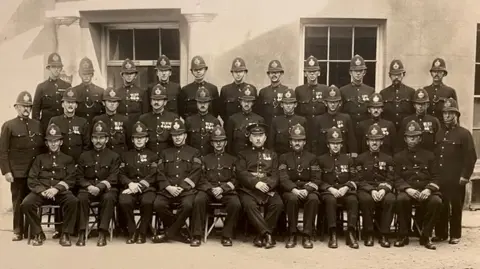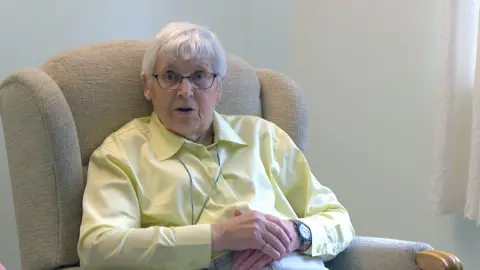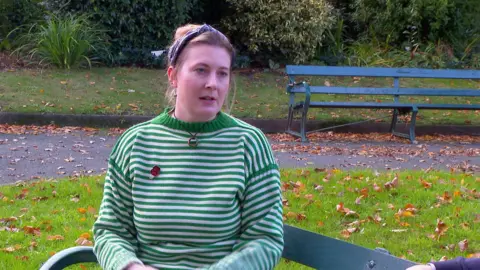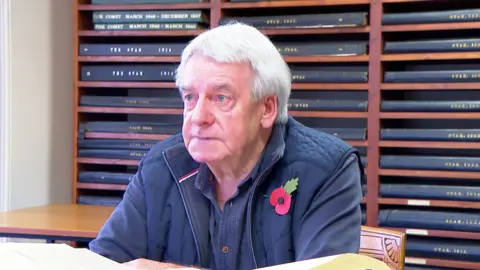Family seeks royal pardon for 'Robin Hood' police
 BBC
BBCThe daughter of a Guernsey policeman convicted during the World War Two Occupation for stealing from the German military has called for a royal pardon from King Charles.
Sgt Fred Duquemin - one of 17 officers convicted of "Robin Hood" thefts, which saw food being stolen to feed hungry islanders - was brought before the local Royal Court, with most imprisoned or sent to labour camps.
Deputy Jonathan Le Tocq said in 2021 he was "very hopeful" the States would be able to introduce a statutory pardon for the officers.
But the Policy and Resources Committee (P&R) ruled it out last month, saying "a conciliatory statement" would be part of the 80th anniversary of the island's Liberation Day.

The Robin Hood reference was a comparison to the English legend of an outlaw who took from the wealthy to help the less fortunate.
Rose Short, Sgt Duquemin's daughter, said her father had been accused of stealing "a packet of sugar and a jar of coffee" from the German military supplies stores.
She has been seeking a pardon from Guernsey's authorities for her father for decades: "This should have been sorted way back in the 1940s.
"We're coming up to the 80th anniversary of Liberation and we would like a pardon from King Charles."
The Royal Prerogative of Mercy has been exercised for hundreds of years.
It does not overturn a conviction - only the courts can do that - but mitigates or removes the consequences that follow conviction for an offence.
For the Channel Islands, the UK's secretary of state for justice is responsible for recommending its use.
'Beaten, kicked, lied to'
Mrs Short said her father was questioned by the German forces but he "only confessed to things the Germans already knew".
She said: "He never gave anybody's name voluntarily.
"They were beaten, kicked, lied to and some of them were even threatened that if they didn't sign the papers that their wives and children would be brought in and treated the same."
The men eventually signed documents written in German confessing to the crimes and that evidence was used against them in their trials.
Sixteen of the policemen were sent to prisons and forced labour camps.
Some of the men who did return home at the end of World War Two were suffering with debilitating diseases and had life-changing injuries, yet they were treated as criminals and denied a place on the force and their pensions.

Jenna Holloway said she was "frustrated" she was still waiting for a pardon for her great-grandfather William Quin.
Mr Quin was arrested for stealing food and trying to cause disruption to the German forces. He was later deported to France and Germany where he served hard labour.
His great-granddaughter said: "These policemen were doing everything they can to try and help the islanders and try to cause disruption to the Germans."
Mr Quin was arrested in 1942 and deported to France and sent on to Germany. The police officers made their way back to Guernsey after the war.
Mrs Holloway said: "When they came back to Guernsey, they lost their jobs, they lost their pensions; they lost the respect of the community.
"There was a lot of Nazi propaganda at the time making them out to be the bad guys and, sadly, some of that has followed through to today."
'Gun to your head'
Keith Friend's father Charles was charged in Guernsey's Royal Court with stealing four tins of tomatoes.
Mr Friend said: "My father said he was told to plead guilty and co-operate and everything would be sorted out after the war.
"One of the things my father did say was it's surprising what you will sign with a loaded gun to your head.
"They were threatened with, if you don't plead guilty in the Royal Court, you will go to the military court where the sentence when they were found guilty would be death."
Mr Friend believes the context of the crimes today were being "overlooked".
"The seventeen police officers didn't think they were doing anything wrong.
"They were feeding hungry people and getting up the Germans noses, they weren't 'stealing' for their own benefit."

Deputy Peter Ferbrache, who is also a lawyer, said he was surprised P&R had changed its stance on granting an official pardon.
He said: "The confessions were beaten out of these men. I know that a theft is still a crime but, if you had a modern case and a confession was beaten out of a defendant, that confession wouldn't be allowed.
"They clearly were ill treated by the German tribunals. The trial in the Royal Court was a disgrace."
Deputy Ferbrache, who was the President of P&R from October 2020 until December 2023, and would have had the authority to progress the work on the potential pardons, but said "resources" held up the process and admitted he was "sad that it's apparently not going to happen now".
Follow BBC Guernsey on X and Facebook. Send your story ideas to [email protected].
